This is the Book! by Oliver DeMille
December 18th, 2014 // 6:47 am @ Oliver DeMille
From the desk of Rachel DeMille….
 Oliver writes a lot, and has published many popular and successful books. But from my vantage point, I could see that his upcoming book is very, very different from all the rest – especially in his mind. I’ve watched Oliver’s intensity and anticipation regarding this work, and wanted to give you a peek into the author’s point of view. He consented to a brief interview…
Oliver writes a lot, and has published many popular and successful books. But from my vantage point, I could see that his upcoming book is very, very different from all the rest – especially in his mind. I’ve watched Oliver’s intensity and anticipation regarding this work, and wanted to give you a peek into the author’s point of view. He consented to a brief interview…
Rachel: What do you want people to know about your new book, The U.S. Constitution and the 196 Indispensable Principles of Freedom?
Oliver: [Chuckles quietly; then grows silent for a moment] This is the book. This is The One. I’ve been working on it for over two decades. It’s ready now, and it can change the world in powerful ways.
Rachel: So you would call it your “Magnum Opus”?
Oliver: Absolutely. Without question. These 196 Principles are not articulated so concisely or collected as such in any other work or body of work that I know of, and I consider them absolutely vital to the future of freedom in our time.
Rachel: I can see why you feel so strongly about this book. How did it come about?
An Important Disagreement
Oliver: To begin, I knew I was deeply moved about the cause freedom when I was very young—well before high school. During those early years my focus was on soaking up as many principles and ideas about freedom as I could. I heard W. Cleon Skousen speak in person on freedom when I was in high school, and I read his book The Making of America. As I listened to him, I knew I’d found my life’s mission.
Sometime shortly after this, the way I studied freedom took a turn. In my readings and as I attended classes, I realized something important: Not only is there a great debate in our society about whether or not we really want to emphasize freedom, but there are also some substantive disagreements about what does or does not promote freedom.
Rachel: That disagreement seems like a pivotal one.
Oliver: Absolutely. And understanding that disagreement reframes the debate over good policy and bad, current events, laws, appointments, regulations, elections, etc. It affects everything in our society.
With this understanding, I started a special file. Every time I came across an indispensable principle of freedom—something that is vital for freedom to flourish, something that directly causes decline when we don’t apply it—I copied it and kept it. I also included quotes and sources that supported these principles. Over the years the file grew into a shoebox, then a bigger box, then a file cabinet. Many of these notes are hand written in the margins and blank spaces of books from many genres.
What They Knew
Rachel: Clearly you’re not publishing a file cabinet full of notes…? How did you distill it down?
Oliver: No – and this is why it has taken me years to write it. I wanted to know as much as Jefferson and Madison about government, history, law, political economy, and freedom. Not in the modern academic sense of narrow specialization, but in the Founding Fathers model of broad and truly deep understanding. That’s a tall order, no doubt. It’s one many of us are still working on. It’s a lifetime calling. But our generation needs such people: Regular people who truly pay the price to study and understand freedom at the level the Founders did.
The question I had was clear: What are the essential principles of freedom, the indispensable things that simply must be applied if we truly want a free and prosperous society?
Some of the things I found were simple and direct, like principles listed in Skousen’s Five Thousand Year Leap or Bastiat’s little book The Law. Others were more obscure, like those found in the writing of Solzhenitsyn, Montesquieu, or Aristotle. Some were downright elusive—not because the Founding Fathers and other great freedom leaders didn’t teach them, but because we’ve stopped talking about them in recent decades.
I found some of the most important principles in the 20-volume collected writings of Thomas Jefferson. I found a lot in the Declaration of Independence and the U.S. Constitution, the Federalist Papers and Tocqueville’s Democracy in America, of course, and other great works like the writings of Blackstone.
The Hidden Principle
I found one hidden away in the writings of Patrick Henry—a principle of freedom that almost single-handedly determines whether or not a society will flourish or move into decline. But this principle is hidden from most moderns; almost nobody today knows it or realizes how truly vital it is.
I searched for the indispensable principles of freedom in every book I read, in every class I took, every seminar I attended, every class I taught, every discussion I led, every speech I gave. Some of the principles came from surprising sources. For example, I found one of the vital principles of freedom in Jane Austen’s Pride and Prejudice, and another in Owen Wister’s The Virginian. This was unexpected, but the principles are powerful.
I eventually put this list of indispensable principles into an outline and started writing this book. I wrote other books along the way, but I kept working on this one. Seemingly everything I learned influenced this magnum opus—a little or a lot. By 2005 I had it book ready. Or so I thought.
But I kept finding new principles as I read and taught, so I had to keep adding new material to the book. “This isn’t ready yet,” I realized. “I need to go re-read the great classics and make sure I haven’t missed any of the indispensable principles of freedom.”
I went back to the bookshelves and re-studied the great classics, all the Great Books and the Harvard Classics, the Annals of America set, the collected writings of many of the founding fathers, shelves of scholarly journal articles, court cases and commentaries, and the leading books on freedom through history, like the writings of Plutarch, Sydney, Cicero, James Wilson, Lord Acton, James Bryce (wow!), Calvin Coolidge, Churchill, Gandhi, Pufendorf, etc.
A Free Society
I pored through page after page, taking more notes, watching the file cabinet of ideas, quotes, and principles grow. In 2008 and 2009 I again prepared a manuscript, had it read by several excellent editors and thinkers, and got ready to publish. In the process I found a few more indispensable principles of freedom and included them. But finding even just a few more concerned me. “I need to be sure I get them all,” I told myself.
I knew I needed more time. This turned into five more years of close research, additional reading and re-reading of American Founding letters, newspaper articles, sermons, speeches, cases, documents, and more review of the greatest world classics on freedom. This was so much fun!
I wrote and rewrote. Edited, researched, added and cut. After four years of research and digging without finding any more indispensable principles of freedom, I knew the book was ready.
Rachel: So bottom line, give us the one-liner that explains what this book is about.
Oliver: Here’s what this book does: It outlines and explains what is necessary for a society to be free. That’s huge!
To Determine a Future
Everyone realizes that just knowing what makes freedom flourish isn’t enough. We have to apply these things—not just know them. But the first step is to know them, and sadly, in our day most people don’t.
If we don’t know them, we certainly can’t apply them. That’s why this book is so important. It clearly outlines what is needed to be a free nation. It outlines the 196 indispensable principles of freedom. Pure and simple.
If we know and apply these things, we’ll be free. If we don’t, we won’t.
This is powerful. It is real.
Rachel: Thanks, Oliver! Final thoughts for our readers?
Oliver: After over twenty-six years (not including the two years I lived in Spain serving a religious mission for my church) of reading, researching, debating, and analyzing history, current events, the principles of liberty, and the great classics, I’m so excited to put this all together in this important book. It’s been a labor of love: To bring the truly indispensable principles of freedom to the regular people who ultimately determine the future of any society.
The Need
I hope parents will encourage this book with every young person, and that any adult who cares about freedom will read it closely.
I love freedom. I believe it is the way God wants people to live in this world. It brings more happiness, prosperity, opportunity, and family success than any other economic or political system. I have dedicated my life to doing whatever I can to promote freedom—real freedom, not frustrating politics—in the world. I am so grateful to the many people, friends, mentors, writers, thinkers, leaders and others who have directly or indirectly helped clarify these 196 indispensable principles of freedom. They are incredibly powerful!
Again, if we use them, we can restore freedom to any society or nation. If we don’t, we can’t.
So, I repeat: This is the book. This is the one. We need our generation to read it. Anyone who cares about freedom, this book is dedicated to you.
This hardback, high-quality book retails at $ 27.95, but it is available right now at the special pre-print discounted rate of $13.95. To preorder Oliver DeMille’s new book, The U.S. Constitution and the 196 Indispensable Principles of Freedom, click here >>
 Oliver DeMille is the New York Times, Wall Street Journal and USA Today bestselling co-author of LeaderShift: A Call for Americans to Finally Stand Up and Lead, the co-founder of the Center for Social Leadership, and a co-creator of TJEd.
Oliver DeMille is the New York Times, Wall Street Journal and USA Today bestselling co-author of LeaderShift: A Call for Americans to Finally Stand Up and Lead, the co-founder of the Center for Social Leadership, and a co-creator of TJEd.
Among many other works, he is the author of A Thomas Jefferson Education: Teaching a Generation of Leaders for the 21st Century, The Coming Aristocracy, and FreedomShift: 3 Choices to Reclaim America’s Destiny.
Oliver is dedicated to promoting freedom through leadership education. He and his wife Rachel are raising their eight children in Cedar City, Utah.
Category : Aristocracy &Blog &Book Reviews &Citizenship &Community &Constitution &Culture &Current Events &Education &Entrepreneurship &Featured &Generations &Government &History &Leadership &Liberty &Mission &Politics &Statesmanship
Symbolic Language
April 22nd, 2014 // 3:32 pm @ Oliver DeMille
Two Different Americas
There are two classes in modern America, the literal class and the metaphorical class.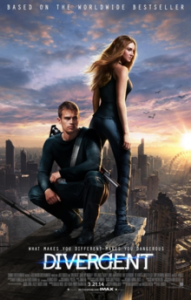 In the increasing divide between the “haves” and the “have nots,” this language difference is central.
In the increasing divide between the “haves” and the “have nots,” this language difference is central.
Those who don’t understand the language of metaphor are falling behind in the widening gap that is the global economy. They are watching their family’s standard of living decrease over the decades.
This trend will only increase in the years ahead.
Those with a quality education learn to think, to readily see symbolism wherever it is found. But most Americans and Westerners are part of the literal class—symbolism is often lost on them.
They tend to see things without the metaphor.
Parental Guidance
For example, last year a long debate raged on social media about whether or not The Hunger Games trilogy was good or bad reading for youth. The most interesting thing about this debate wasn’t the arguments made by either side, but the fact that symbolism was hardly ever part of the debate.
But the symbolism is glaring: A nation sacrifices its helpless children for the convenience, entertainment, and libertine moral values of the urban upper class, while government, media, and big wealth combine to keep their control over the outlying, rural people dedicated to “archaic” family values.
What could be a closer parallel to our modern society? And what metaphor could ever more clearly point out the hypocrisy of the American cosmopolitan class and its views on abortion?
What Was Missed
To anyone trained in symbolism, the metaphor is obvious. We watch children killed for the convenience and political values of the elite class. And note that in The Hunger Games the urban classes have collectivist economic views combined with libertine moral values—the same as those in the real world who support Roe v. Wade and easy abortion laws in modern America.
This is blatant symbolism, but only the upper classes really understood this.
In fact, some of the most vocal voices declaring that The Hunger Games books and movies are inappropriate for youth came from people who are strongly against abortion.
They just didn’t understand that The Hunger Games was probably the biggest, best, and most popular anti-abortion movie ever. This was entirely lost on the literal classes.
When the ruling classes understand literal and symbolic language, while the masses only understand the literal, freedom is in decline and the power of the ruling classes will only increase.
This was true in Shakespeare’s day, in the time of Virgil, and when the Psalms and Proverbs were written.
The elite classes, steeped in the classics and great books that teach readers how to think (especially symbolically), are always going to rule over the literal classes whose education is limited to getting the “right” answers, preparing for jobs and careers, and not really thinking about things symbolically.
Allan Bloom warned that modern America has this problem at the level of Hitler’s Germany.
The Real Fascination
Another example: People in the literal classes can’t quite understand why today’s youth are so intrigued by vampire books, movies, and television programs. “What is this fascination with vampires?” the literal classes ask.
The elite classes, well-versed in metaphor and symbolism, know better. They understand that vampires are symbols of something—something many young people struggle with.
Imagine a society made up of two major groups. First are the hard-working, regular people who live in middle-class neighborhoods, go to work every day, raise families, sleep during the night (because they have to go to their job tomorrow), send their kids to school in order to get a good career in their adult lives, etc.
The second group in society is made up of a few people who have trust funds, inherited wealth, can get in trouble with the law but get out of it relatively easily, stay up through the night at fancy balls and dinners, then go home in the early morning and sleep late into the day, and have more power, wealth, fun and entertaining lives, and sophisticated connections with other aristocrats far beyond the local community—and even around the world.
The first group envies the second, while the aristocratic second group hardly gives a thought to their “inferiors.” Parents of both groups warn their children not to mix with the other group—because it inevitably causes many problems.
This clearly defines two things: 1) an aristocratic society, like all elite societies that have existed in human history, and 2) every group of vampires portrayed in literature, juvenile fiction, and in movies and TV programs.
But the literal classes mostly miss this symbolism. “Why do the kids like vampires?” the literal classes ask.
Some literal writers even try to explain how youth like to be scared, so they love the idea of biting strangers dressed in black. So literal. So shallow.
Answer: The kids don’t love actual vampires, they love the idea of rising into a higher class. In high school, this is a driving passion for many teenagers. If movies are to be believed, it’s the driving theme for most students in most high schools.
In such an environment, vampires are the shortcut to social success. If one bites you (dates you, likes you, includes you in his group, etc.) you immediately climb to a higher social class. The highest social class, in fact.
The one that has the money, the power, the mystery, and the worldwide connections (rather than the homegrown limits of the coal mines, a job at Blue Bell’s Rammer Jammer, or a lifetime of alumni fundraising for the Friday Night Lights).
The fact that many parents tell you to ignore the vampires (“Don’t worry about high school cliques, or being popular. It won’t even matter after you graduate.”) just adds to the intrigue.
Vampires are aristocrats. Elites. People with enough money, power and connections to ignore the limits most people and families struggle with—as youth, and also as adults.
The kids instinctively understand this, though their literal parents may not.
The Old Tool
This language barrier isn’t new.
In aristocratic Britain, the upper classes pronounced words differently than the lower and working classes—so elites would always know who they were dealing with. In fact, the pronunciations were literal (pronounce every syllable) versus symbolic (skip syllables, if you’ve been trained by other aristos and know what to look for).
For example, the word Worchester was pronounced “wor-ches-ter” by the lower classes, but simply “wis-ter” by the nobles. Or the name St. John was pronounced “Saint John” by working classes but “Sinjin” by nobility (see Jane Eyre). There are thousands of similar words.
This boils down to two classes, the Literal versus Symbolic. Checkers versus Chess. “Tell me the right answer, so you can pass the test and someday get a good job,” versus “Tell me your opinion, because there are many possible correct answers, and our purpose is to help you learn how to think—so you can become a leader.”
These are how public schools versus elite prep schools, respectively, generally teach.
The Price of the Literal
Facts versus Metaphor. Precision versus Imagery. One Meaning versus Poetic Allegory.
Again, the elite classes are well educated in both of these dialects. The problem is that the middle and lower classes are not. They only know the literal meanings of words.
This is a growing concern, because it causes increased divisions between the elites and the regular people. The masses don’t understand what is happening to their society, because they don’t speak the language of metaphor. When President Obama promised, “If you want to keep your doctor [under Obamacare], you can keep your doctor,” the two classes heard very different things.
The literal classes heard: “If you want to keep your doctor, you can keep your doctor.” Hearing this, they planned their family and business finances and voted accordingly.
The symbolic classes, trained in metaphor, heard the following: “If you want to keep your doctor, you can keep your doctor, or at least one that is just as good; or, even if you can’t keep your doctor under the new plan, the nation will be better off, so it’s worth the change anyway.”
The symbolic class knows that political promises are rhetoric, meant to win elections—not meant to actually, literally be fulfilled. The literal class is slowly realizing that this is the case, but they still feel lied to by each new candidate. In reality, they just don’t understand metaphorical language.
A teacher I know once shared the following quote by Groucho Marx with her class: “Outside of a dog, a book is a man’s best friend; inside of a dog it’s too dark to read.” One student was very frustrated with this little proverb. When questioned, the student said emotionally, “This is so cruel to dogs. Why would anyone want to read inside of a dog?”
When the literal class doesn’t easily and immediately understand symbolism, it will lose its freedoms to the elite ruling class that does.
The Missed Symbols
I wonder what people will say about the book and movie popularity of Divergent. It is a great symbolic attack on the modern public school system and the way we choose careers and jobs in the U.S., Canada, and Europe—but I bet there will be a number of homeschoolers, charter school and non-traditional educators and parents who miss some key points.
First: this is not a book for youth; the intermittent suggested sensuality that is predictable and “natural” for youth in crisis who depend upon each other without family support is not suitable for most youth.
Second: this book is for adults, and it may be the best promotion for homeschooling and other cutting-edge, new educational choices since…well, ever.
If non-traditional education seizes this opportunity, there will be a lot of support for Divergent, because people will understand its symbolism: Each person is different, and each person has unique genius inside.
The purpose of education is to help each student discover and develop his or her inner genius and passion, and use it to improve and serve the world. When the focus is on making every child fit in, it’s not education at all. At best it’s training, at worst brainwashing.
This is the overarching message of Divergent—but will it be lost on the literal class? I hope not.
We all can benefit from including more symbolic thinking in our reading. It’s like a new mantra for 21st Century leadership: Read more, think more, serve more. And look for symbols and metaphor in everything you read.
Join Oliver for Mentoring in the Classics >>
 Oliver DeMille is the New York Times, Wall Street Journal and USA Today bestselling co-author of LeaderShift: A Call for Americans to Finally Stand Up and Lead, the co-founder of the Center for Social Leadership, and a co-creator of TJEd.
Oliver DeMille is the New York Times, Wall Street Journal and USA Today bestselling co-author of LeaderShift: A Call for Americans to Finally Stand Up and Lead, the co-founder of the Center for Social Leadership, and a co-creator of TJEd.
Among many other works, he is the author of A Thomas Jefferson Education: Teaching a Generation of Leaders for the 21st Century, The Coming Aristocracy, and FreedomShift: 3 Choices to Reclaim America’s Destiny.
Oliver is dedicated to promoting freedom through leadership education. He and his wife Rachel are raising their eight children in Cedar City, Utah.
Category : Aristocracy &Arts &Blog &Book Reviews &Citizenship &Community &Culture &Education &Family &Leadership &Liberty &Mission
Understanding the Battle
July 10th, 2013 // 6:34 pm @ Oliver DeMille
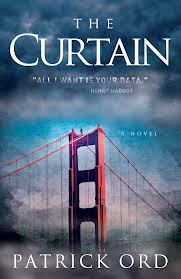 The following describes one side of the modern battle for our future:
The following describes one side of the modern battle for our future:
“You believe you can change the world for good, one person at a time. You prioritize your children and your neighbors above your own consumption.Fulfillment for you comes through love and service, not accumulation of material goods.”
And the next one describes how the other side of the battle attacks the good:
“I’d thought these ideas placed people like you in an emotionally vulnerable position. You strive for an ideal, and since people are inherently imperfect, they will ultimately let you down….
“I obscured the idea of intrinsic self worth by encouraging comparisons with other people—people who were unnaturally perfect because I made them up. I appealed to peoples’ egos as well as their insecurities by promoting the idea that it was not enough to be unique or to do good.
“My intent was to convince them that the only meaningful accomplishment was to be better than someone else. That got them more concerned with promoting a perception of goodness than with actually doing good.”
These profound words, from The Curtain by Patrick Ord (which is a great and fun read), provide a nutshell summary of what is wrong with our modern world and why freedom is in decline.
Let’s be clear.
It is essential to teach our children than being your unique self and doing good really is enough.
In fact, it is what life is all about.
Doing good. Serving others. Improving the world.
Nobody needs to be better than others, we all just need to be the best we can personally be.
We don’t need to be perfect, but we do need to lose our lives in doing good things.
We must never be distracted into promoting a perception of goodness.
We should put all our energy into actually doing good.
Not forcing good through government, but just getting to work helping the world become a better place.
These principles are simple and true.
But the future of freedom depends on most of us really believing and living them.
***********************************
 Oliver DeMille is the chairman of the Center for Social Leadership and co-creator of Thomas Jefferson Education.
Oliver DeMille is the chairman of the Center for Social Leadership and co-creator of Thomas Jefferson Education.
He is the author of A Thomas Jefferson Education: Teaching a Generation of Leaders for the 21st Century, and The Coming Aristocracy: Education & the Future of Freedom.
Oliver is dedicated to promoting freedom through leadership education. He and his wife Rachel are raising their eight children in Cedar City, Utah.
Category : Blog &Book Reviews &Citizenship &Featured &Government &Leadership &Producers &Service &Statesmanship
Summer Reading for YOU
June 14th, 2013 // 10:56 am @ Oliver DeMille
5 Recommended Books for the Summer
by Oliver DeMille
“Dad, can you read to me more?” Meri asked me.
Surprised, I looked up from my book and responded, “Oh, sure.”
I took the book she was reading and read a chapter aloud to her. When I finished, I handed her the book.
“Thanks, Dad,” she said. “I could have read it myself, but I just love it when you read. I mean, in the winter you read to us a lot, and with all our classes and other activities it seems like I learn a lot from you, and all my other teachers.
“In the summer is when Mom reads to us the most, out on the couch on the porch, but I don’t learn as much from other people, and it seems like you don’t read to us as often.”
Meri walked away with her book, but our little conversation got me thinking. I’ve always taught that winter is the key time for family reading. But I think that summer is the most important time for kids to see their parents reading—mainly because they tend to spend less time on official “schooling” activities and more relaxed time with parents (and observing their parents’ leisure activity choices) during the summer months.
When children and youth see their parents reading a lot, they naturally value reading. When children and youth value reading, they read more.
Our choices during summer to make a huge difference in the education of our kids, and one of the most impactful things a parent can do is set the example of reading. If your kids see you reading books a lot, especially during summer leisure, not only are you filling your bucket of ideas and resources, but the example you set can drastically influence them. Reading is powerful!
On the national scale, all free societies are reading societies, and reading starts in the home!
Here’s a great summer reading list* that I’m following. I’m making sure all my children and youth see me reading these books this summer. And I’m really going deep—by reading with a highlighter and pen, taking notes and marking quotes as I go. I’m sharing these books because I hope you’ll do the same:
The Early History of Rome, by Livy
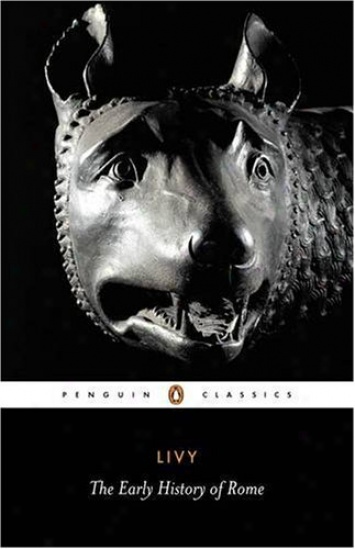 This great book isn’t part of the Great Books of Western Civilization, but it could be. I want my children and youth to see that I care about history, and I’ll look for opportunities to share Livy’s stories with them and talk about the connection between reading history and being successful leaders in life.
This great book isn’t part of the Great Books of Western Civilization, but it could be. I want my children and youth to see that I care about history, and I’ll look for opportunities to share Livy’s stories with them and talk about the connection between reading history and being successful leaders in life.
Rascal, by Chris Brady
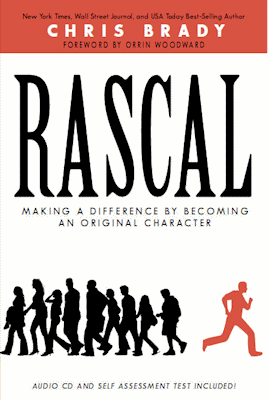 I want my kids to know what a “rascal” is–at least the way Brady defines it. I want them to be the kind of people this book promotes, and I can’t wait for them to ask me about this book.
I want my kids to know what a “rascal” is–at least the way Brady defines it. I want them to be the kind of people this book promotes, and I can’t wait for them to ask me about this book.
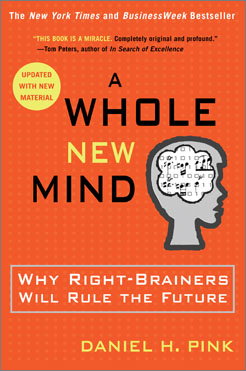 A Whole New Mind, by Daniel Pink
A Whole New Mind, by Daniel Pink
I want my youth to be innovative, creative, and have initiative. This is one of the hardest things to teach, but I’ll look for opportunities to discuss these things as I read this book.
Isaiah, in the Bible
I love sharing scriptural verses with the kids and discussing the meanings and lessons. It leads to a lot of important conversations with the kids about the most important topics.
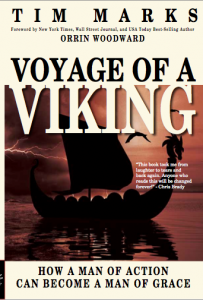 Voyage of a Viking, by Tim Marks
Voyage of a Viking, by Tim Marks
I can’t wait to talk to my kids and youth about this book! It’s about seeking for greatness, learning from your mistakes, not settling for mediocrity, and constantly improving yourself. I know the title of this book will have all my kids asking me questions about it!
Chillin’ and Grillin’
This week I’ve been reading these books in the evenings outside by the grill and the court where the kids play basketball, in the hot afternoons near the swamp cooler, and in the kitchen before meals and during cleanup after the family eats. I’ve taken turns with each book, so I’m a few chapters into all five of them, but I’ve had more than one discussion about each with the kids.
Tonight as dinner started, I got everyone’s attention and said, “I’m reading this awesome book. Actually, I’ve read it before but I’m re-reading it and I want to share something from it that really touched me.”
Everyone quieted down and listened. “Here goes,” I said. Then I read from Voyage of a Viking:
Kids can be pretty relentless in teasing one another, and the kids in my school were no different. I had never before been the subject of teasing and bullying, so it was a new experience for me. You see, news of my parents’ divorce got around town pretty quickly, and it wasn’t too long before the news hit my schoolyard.
The little kids in the family were leaning forward at full attention, and even the teens were paying close attention. I kept reading:
And then the teasing began. ‘There’s Tim, and he doesn’t have a dad,’ the kids would whisper to each other and taunt me.
I stopped reading and asked, “How would that make you feel?”
“I’d hate it!” Meri said forcefully. The other kids agreed.
After they shared their feelings, I asked, “Have you ever been teased like that?” We discussed this for a while, then I asked everyone, “Okay, I have another question. Have you ever teased anyone this way?”
“No way!” Meri exclaimed. She is nothing if not earnest.
“Are you sure?” I asked slowly.
Everyone considered. “Well, actually,” Meri said, then she told several stories of when she wasn’t very nice to people in her life. The other kids shared too, and we had a great conversation about being good friends and also standing up against bullying even when the victim isn’t your friend.
When I read what happened next in the book, everyone got even more interested. You’ve got to read it to get it! We spent dinner talking about this and discussing it.
At the end, I said, “I’m so excited to read the rest of this book.”
“Me too,” America said emphatically. “Meri” is nine years old, and she loves to read. I don’t know when she’ll read Voyage of a Viking, but I’ll be sharing from it and the others on my list all summer.
Actually, I’m having a hard time reading it because after our dinner discussion my visiting twenty-year old daughter Sara borrowed my copy and is reading it. Oh well, she reads fast. In the meantime, I’ve got the other four books.
Tomorrow at breakfast I’m planning to share the following quote from Livy, where he says that he is excited to write about Rome because, as he puts it:
I shall be able to turn my eyes from the troubles which for so long have tormented the modern world.
I’ll ask the family, “Why do you think people always feel that the modern, current world is so chaotic and hard and that the people in history somehow had things more simple? I mean, Livy thought this clear back in the time of Jesus Christ.”
This question is more for the teenagers, while yesterday’s conversation was perhaps more accessible to the younger kids. But everyone takes part in all of it. The older ones (me included!) bear reminding about Core Phase issues, and the younger ones benefit immensely by being including in the discussion of “serious” topics of academic and intellectual interest.
I could go on and on sharing examples of how to do this, but I’ve got a book calling to me. I’ve finished work for the day, and I want to read in the yard this evening—so I’ll be near the kids and we can talk.
Maybe I’ll teach them from one of these five books I’m reading, or maybe Meri will bring me a book of her own to read and talk about. Or perhaps we’ll all just sit in the warm evening and watch the sunset and talk. I often have the stack of all five books around with me, so I can just pick and choose which to read and share.
In any case, I’m excited to keep reading and sharing my book list this summer. This first week has been great. I can’t wait to see what we’ll learn about together in the months ahead.
Summer is a great time for education. So just get out your books, start reading, and share! The impact on freedom is huge.
Also check out Summer Reading for Kids >>
*Most of these books are available at your local library. Or, check the affiliate links to see amazon reviews, etc.
Category : Blog &Book Reviews &Business &Citizenship &Culture &Education &Family &Generations &Independents &Leadership &Liberty &Mission &Statesmanship
Wounded by School (book review)
June 14th, 2013 // 10:13 am @ Oliver DeMille
Another important book about freedom (and the lack of it) in modern education is Wounded by School by Kirsten Olson. It outlines the normal ways in which modern education hurts most children, shows the history of why schools adopt such harmful policies, and suggests real solutions.
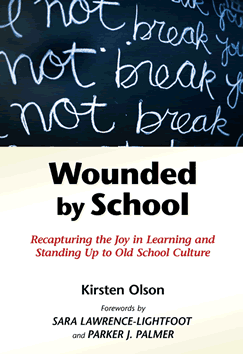 For example, Olson writes: “Many theorists suggest that the purpose of schools is to mold and shape individual self-concept so that pupils will accept a particular place in society…” Is this really what you want for your children?
For example, Olson writes: “Many theorists suggest that the purpose of schools is to mold and shape individual self-concept so that pupils will accept a particular place in society…” Is this really what you want for your children?
On a larger scale, what is the impact on freedom of raising a generation of youth to “accept a particular place in society”? This is a class system, pure and simple.
Olson points out that “Schools are deliberately designed to sort and track” students into order to promote the class system. Olson also suggests that among the key ways modern schools wound students are things like the following:
- I felt sick in school.
- I’m in the middle.
- I must comply.
- I can’t measure up.
- I am better than those below me.
- I must impress my superiors.
- What I want isn’t as important as what my betters want.
- Creativity must be secret—my focus must be conformity.
- Learning isn’t fun.
And for parents: “I feel helpless about saving my child,” and “The experts know what my kids need more than I do.”
Olson’s solutions center around bringing freedom back into schooling. Indeed, this is the focus of a lot of cutting-edge books and research on education.
Above all, we need to be clear about one thing: Freedom works. It does. Freedom is the best choice in society and also in education. If you are a parent or teacher, you have more power than you know. I highly recommend this book.
Category : Blog &Book Reviews &Culture &Education &Family &Leadership











